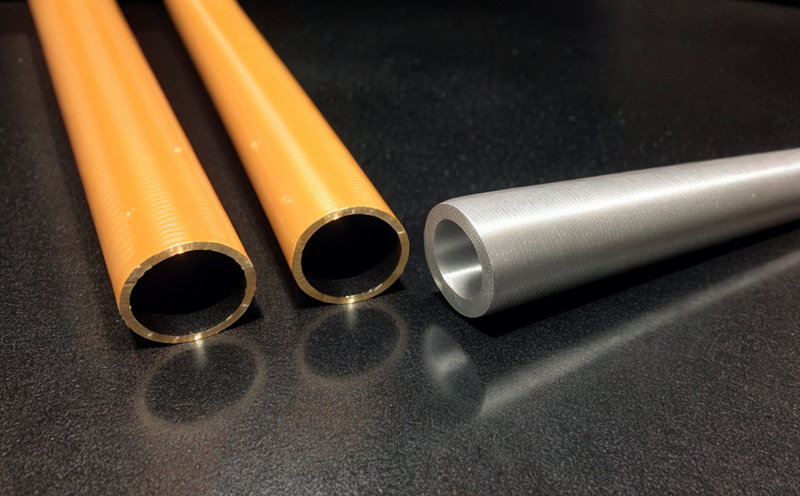ASTM D7248 Damage Tolerance Testing of Sandwich Composites Validation Method Development Test
The ASTM D7248 damage tolerance testing method is a crucial tool in aerospace and aviation engineering, designed to evaluate the integrity and reliability of sandwich composite structures. These materials are widely used due to their high strength-to-weight ratio, which makes them indispensable for aircraft and spacecraft design. The validation process using this method ensures that the materials meet the stringent safety standards required by regulatory bodies such as the Federal Aviation Administration (FAA) and European Union Aviation Safety Agency (EASA).
The testing procedure involves subjecting a sandwich composite to various simulated damage scenarios, including impact, fatigue, and thermal cycling. The goal is to assess how these materials perform under realistic operational conditions, which helps in validating their suitability for specific applications. This test plays a pivotal role in the research and development (R&D) phase of new aircraft designs, ensuring that they can withstand the stresses encountered during flight without compromising safety.
The ASTM D7248 method is particularly applicable to composite materials used in critical components such as wing structures, fuselage sections, and landing gear. By simulating real-world conditions, this testing ensures that any potential weaknesses are identified early in the design process. This proactive approach not only enhances the overall safety of the aircraft but also reduces the risk of costly redesigns or field failures.
The process begins with the preparation of the composite specimen according to ASTM D7248 specifications. This involves carefully selecting and cutting the material into a shape that mimics its intended use in an aerospace application. The specimen is then subjected to controlled damage, typically through impact testing using specified tools and parameters. Following the introduction of the damage, further tests assess the structural integrity of the composite by measuring strain, stress, and deformation.
The validation process also includes detailed analysis of the material's response under various loading conditions. This comprehensive evaluation ensures that the composite can withstand expected operational stresses without failing catastrophically. The results are compared against established standards to validate the design and manufacturing processes used in producing these materials.
One of the key advantages of using ASTM D7248 is its ability to provide accurate and repeatable test results. This consistency is crucial for ensuring that the testing process can be relied upon to make informed decisions about material selection and component design. By adhering strictly to the method's protocols, laboratories like ours ensure that every test result is valid and can be used confidently by manufacturers and designers.
The ASTM D7248 test also supports continuous improvement in composite manufacturing processes. By identifying any inconsistencies or areas for enhancement, this testing helps drive innovation in material science and engineering practices. This ongoing refinement ensures that aerospace structures continue to meet the highest standards of safety and performance.
Why Choose This Test
The ASTM D7248 damage tolerance test is an essential tool for ensuring the reliability and longevity of composite materials used in aerospace applications. For quality managers, compliance officers, R&D engineers, and procurement professionals, this method offers several key advantages:
- Regulatory Compliance: Ensures that materials meet FAA and EASA standards.
- Enhanced Safety: Identifies potential weaknesses early in the design process.
- Cost Savings: Reduces the risk of costly redesigns or field failures.
- Innovation Support: Drives continuous improvement in manufacturing processes and material science.
The test's rigorous nature provides confidence that the materials are fit for purpose, thereby supporting better decision-making throughout the design and manufacturing stages. This robust validation process is crucial for maintaining the highest standards of safety and performance in aerospace engineering.
Quality and Reliability Assurance
The ASTM D7248 test plays a vital role in ensuring that composite materials used in aerospace applications meet the required quality and reliability standards. By subjecting these materials to controlled damage scenarios, the test provides valuable insights into their performance under realistic operational conditions.
- Strain Measurement: Accurate measurement of strain helps assess material deformation.
- Stress Analysis: Detailed stress analysis is crucial for evaluating load-bearing capacity.
- Deformation Assessment: Monitoring deformation ensures structural integrity under various loading conditions.
The test results are compared against established standards to validate the design and manufacturing processes. This rigorous evaluation process helps ensure that aerospace structures can withstand expected operational stresses without compromising safety or performance. By adhering strictly to ASTM D7248 protocols, laboratories like ours provide consistent and reliable testing results that can be trusted by manufacturers and designers.





